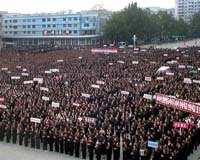| . |  |
. |
Washington (AFP) May 27, 2009 The United States is unlikely to begin boarding North Korean ships in search of weapons of mass destruction despite the Stalinist state's latest nuclear and missile tests, analysts say. But the tests are giving renewed importance to a six-year-old US-led effort that has enlisted 95 countries in an often secretive effort to prevent the spread of nuclear, chemical, and biological weapons. Overcoming its reluctance to offend the North, South Korea this week announced that it will become a full participant in the Proliferation Security Initiative. "It sends a strong message to the North Koreans that they are not going to get away with any efforts to proliferate this technology," said Nick Szecheny, an expert at the Center for Strategic and International Studies. But North Korea quickly drew its own line in the sand, warning Wednesday that any attempt to board its ships would be met with "an immediate and strong military strike." "Some of this is bluster," Szecheny told AFP. "The North Koreans like to escalate the rhetoric in order to generate hasty responses from the US and the international community. So you can't overreact. On the other hand it is very serious threat," he said. It remains unclear whether the initiative has resulted in the boarding of a single North Korean ship since it was launched in May 2003 by the administration of former president George W. Bush. Robert Joseph, a former under secretary of state for arms control, wrote in the Washington Times last year that "dozens of interdictions have taken place slowing nuclear and missile programs in Asia and the Middle East." But US officials have provided few specifics, shrouding the program in a level of secrecy that has made its effectiveness hard to measure. Still analysts said it has served a useful purpose in expanding counter-proliferation efforts and techniques beyond an inner core of about 20 industrialized countries, largely the United States and its European and Asian allies. "I think it is, while maybe difficult to specify or quantify the ways in which PSI has affected North Korean behavior, it has been extremely effective in getting countries in the region to take a unified role to counter-proliferation," said Szecheny. Some 37 multilateral exercises have been held under PSI auspices in different parts of the world, training military and law enforcement against WMD scenarios that test the legal limits of what individual nations can do. It also has fostered intelligence sharing among participating countries about maritime or aircraft traffic. "The idea of PSI is to loosely coordinate the actions of various countries employing their own domestic law as well as international law on maritime activities to be able to stop people when you have reason to suspect they are doing various nefarious things, especially with WMD," said Michael O'Hanlon, an expert at the Brookings Institution. "But you do it within the confines of law as previously existing. So you stop ships in your territorial waters, for example, or if the country whose flag flies over the ship will it allow you stop ships on the high seas," he said. That flexibility allows countries to contribute to the degree that they want, which may explain the broad participation in the initiative. "The real benefit is now that PSI has 95, 96 participants or adherents, it has gone far beyond the core group of countries where a lot of this cooperation has been going on for some time," said Peter Crail, a research analyst at the Arms Control Association. "And increasing their involvement in the future will be a big help," he said. China, however, has not joined the initiative, limiting its reach in a crucial area surrounding North Korea. South Korea until now also had declined to take part because it did not want to spoil its engagement efforts with North Korea. "The South Koreans have indicated that they are going to be focused primarily on their own territorial waters, and if North Korea were going to be exporting something it is unlikely it would be taking that route. "So whether the South Korean commitment contributes to a sudden surge of PSI activity is open to question. But its very significant in sending a strong message to the North Koreans," Szecheny said. Share This Article With Planet Earth
Related Links Learn about nuclear weapons doctrine and defense at SpaceWar.com Learn about missile defense at SpaceWar.com All about missiles at SpaceWar.com Learn about the Superpowers of the 21st Century at SpaceWar.com
 NKorea hails nuclear test as UN weighs response
NKorea hails nuclear test as UN weighs responseSeoul (AFP) May 27, 2009 North Korea held a mass rally to celebrate its nuclear test and reportedly restarted a plutonium-producing plant, as world powers pondered how to punish the communist state for its defiance. Unfazed by international anger at its second bomb test, Pyongyang has also test-fired six short-range missiles and reportedly intensified military exercises in regions close to South Korea. The United ... read more |
|
| The content herein, unless otherwise known to be public domain, are Copyright 1995-2009 - SpaceDaily. AFP and UPI Wire Stories are copyright Agence France-Presse and United Press International. ESA Portal Reports are copyright European Space Agency. All NASA sourced material is public domain. Additional copyrights may apply in whole or part to other bona fide parties. Advertising does not imply endorsement,agreement or approval of any opinions, statements or information provided by SpaceDaily on any Web page published or hosted by SpaceDaily. Privacy Statement |